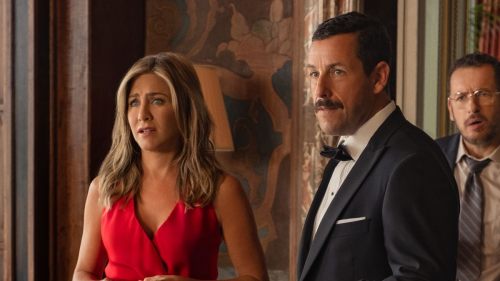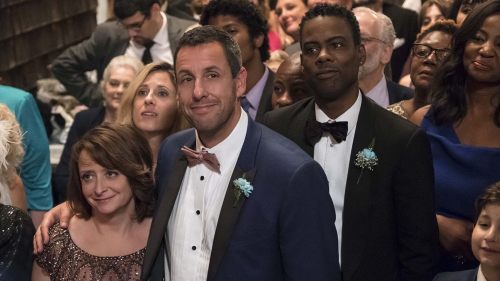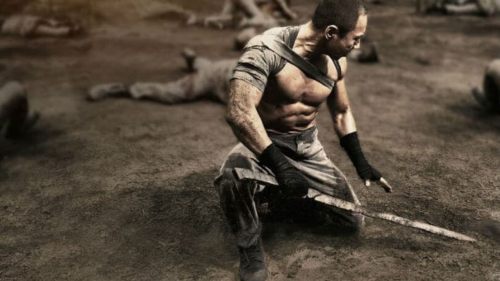Adam Sandler’s 100% FRESH Is Great, And That’s Kind Of A Bummer
It’s hard being an Adam Sandler fan. Most of our love is based on cherished history of watching him on SNL, listening to They’re All Gonna Laugh at You and enjoying the weird irreverence of Billy Madison and Happy Gilmore. But even after Sandler gave himself over to family-friendly Hollywood movies, he still somehow snuck in occasional flashes of brilliance. Punch Drunk Love is an obvious go-to, but even some of his later comedy star vehicles are worthwhile, particularly That’s My Boy and You Don’t Mess with the Zohan. It would be easy if he were horrible and worth writing off. But the occasional gems mean we just can’t do it.
A big one just dropped with Sandler’s Netflix comedy special 100% Fresh. We haven’t thought of Sandler as comedy performer in a very long time, much less a stand up comedian. It turns out, when you take away the glamor of Hollywood, the tired cronies (well, most of them, Rob Schneider shows up) and just put the guy on a stage with nothing but a piano player, he’s more or less the same old comic. Juvenile and foul but also oddly innocent with a strong talent for left-field surprise punchlines. Sandler also hasn’t lost his ear for hilarious non-jokes and the beautify of raw weirdness. The main notable changes between this Sandler and his younger self is a slightly larger worldview and some straight up sincerity toward the end that might actually choke you up.
While Sandler’s stage show is remarkably pared down, 100% Fresh’s presentation is anything but. Longtime Sandler collaborator Steven Brill captures Sandler at a number of different performances, each with a noticeably bigger audience - from dress rehearsal to busking in a subway station to a grand theater - changing locations between each joke to illustrate the show’s journey from intimate and vulnerable to ambitious and perfected. The effect is interesting all by itself, but it also brings you in closer to Sandler as a working individual, stripping him of his long-held Hollywood status.
Songs fill most of Sandler’s set. While a few are fleshed out, most are minor vignettes that set up a premise and immediately terminate upon the delivery of a short punchline. While not very deep, they come and go quickly and match the show’s largely stripped-down feel. The longer, more traditional songs take a greater risk if the premise doesn’t work, as with Sandler’s duet with Rob Schneider about an astronaut and cosmonaut who keep “accidentally” 69-ing in space. Some are great, however, including one standout in which Sandler plays a would-be hero who keeps trying to save the day but fails because he doesn’t know how to do anything helpful.
Some songs bring with them a hip-hop style that immediately draws comparisons to The Lonely Island’s SNL digital shorts. One in particular, I’m just going to call it “Phone Wallet Keys”, even matches Lonely Island song structure in its joke escalation. While some may immediately cry foul regarding these similarities, it’s also worth noting the influence Sandler had on The Lonely Island in the first place and whether this isn’t just a chicken-egg situation.
The true highlight of the show isn’t even funny. Sandler finishes the set out with two numbers of pure sincerity. One is a revamped version of The Wedding Singer’s “I Wanna Grow Old With You” dedicated to his wife. The other, a long and detailed tribute to Chris Farley, complete with moving visual aids. David Spade tends to do the most public speaking on Chris Farley’s death, so it’s interesting to get such a thorough take from Sandler, though if you squint, he does seem to celebrate Farley’s successful desire to go out like his heroes John Candy and John Belushi. Nevertheless, there’s always been a strange sadness to Adam Sandler that keep these songs from seeming out of place while also adding a surprising extra dimension to this special.
All this brings up the same questions all great Sandler efforts raise: Why can’t he be this good all the time? Why so many horrible movies, when he clearly still has the talent to do so much more? The obvious answers remain: Hollywood money, using films to take vacations and keep his pals employed. Funny People wasn’t a masterpiece, but it directly examined this aspect of Sandler’s career and exposed it as a sad thing, which made it all the more disappointing when it failed to inspire much change in Sandler’s choices.
Nine years later, maybe it made a mark after all. Yet, the sadness of my headline refers to the likelihood that we may wait just as long for another flash of pure Adam Sandler comedy like this. His voice is not for everyone, but for old fans, it truly is one of a kind. The fact that we hear it so seldom is unfortunate, especially with this proof that it still exists, alive and well. Sandler just has to have the desire to use it.



